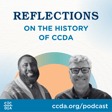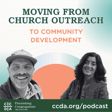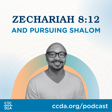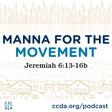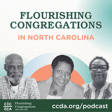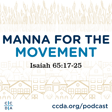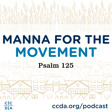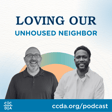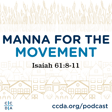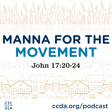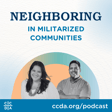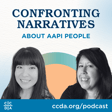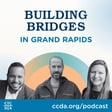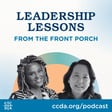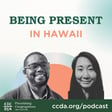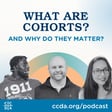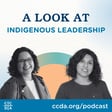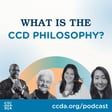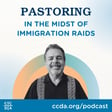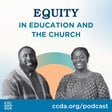Introduction and Guest Introduction
00:00:09
Speaker
Hey, everybody, welcome to the CCDA podcast.
00:00:12
Speaker
My name is Scott Overpeck.
00:00:13
Speaker
I'm the director of membership and conference here at CCDA, and I'll be your host today.
00:00:18
Speaker
I'm really, really excited.
00:00:19
Speaker
Today, we are going to talk about Grand Rapids, and I've got some great guests with me, Justin and Nate Bean from the Grand Rapids Center for Community Transformation.
00:00:28
Speaker
Would you guys just tell us a little bit about yourself?
Nate Bean's Journey and Passion
00:00:31
Speaker
So maybe a little bit about me born and raised southeast side of Grand Rapids.
00:00:37
Speaker
I always kind of had a passion for, I would say, community and business or people in business.
00:00:44
Speaker
I won't share all the in-between details, but kind of coming out of a year of college, I ended up pursuing a trade school.
00:00:52
Speaker
Decided that a four-year degree kind of wasn't my thing.
00:00:55
Speaker
I went into a trade school and started kind of working with my hands.
00:00:59
Speaker
And I always kind of had this knack for entrepreneurial things, but that wasn't all of kind of what I felt like I wanted to do.
00:01:07
Speaker
And then started working with people through a couple of social service agencies here in Grand Rapids and kind of decided that marrying my two passions of entrepreneurialism and growing people was something that I wanted to pursue.
Justin's Academic and Collaborative Journey
00:01:22
Speaker
And so got involved with social enterprise with my brother here.
00:01:26
Speaker
And long story short, we've grown a couple things, a couple enterprises and kind of a nonprofit collaborative that we are operating now.
00:01:37
Speaker
And I'm currently serving as the COO of that organization.
00:01:42
Speaker
Justin, Nate's older brother, although we get asked that all the time, who's older?
00:01:47
Speaker
But we're close in age.
00:01:48
Speaker
We've been friends and partners for the past almost 20 years together in this work.
00:01:54
Speaker
And it's been a pleasure to work alongside Nate.
00:01:57
Speaker
I always say that Nate is, he's a visionary, but he's also a great operational mind.
00:02:02
Speaker
And so he has been
00:02:04
Speaker
a great gift to me and my visionary brain that's always thinking about things to do in the next 10 or 20 years.
00:02:14
Speaker
Nate slows me down and helps make some sense out of it, helps us get things done, offers new frameworks and processes.
Theological Integration and Community Challenges
00:02:21
Speaker
But yeah, my route was similar to Nate's, although a bit more academic, spent way too long in school and then seminary and almost disgruntled with
00:02:33
Speaker
kind of first studying social work and then went to seminary.
00:02:36
Speaker
I felt like in school for social work, I felt like there wasn't enough or any theology.
00:02:43
Speaker
There was no place for me to bring in at a secular university my faith.
00:02:47
Speaker
I felt frustrated, which is why I went to seminary, not to be a pastor, but specifically in Grand Rapids, there's over 900 churches.
00:02:56
Speaker
Protestant Church of America, Reformed Church of America, Christian Reformed Church of America, all headquartered in Grand Rapids, lots of seminaries, lots of Christian bookhouses, Kriegel, Bakers, Zondervan.
00:03:07
Speaker
To have some of the statistics that maybe we'll get into, but one of the most philanthropic communities in the country and yet one of the worst places for African-Americans to live in terms of economics.
00:03:16
Speaker
And that was some study that came out 10 years ago, and that was median income, entrepreneurship, and homeownership.
00:03:23
Speaker
And our Forbes and Huffington Post kind of said the same thing.
00:03:26
Speaker
Ten years later, MLive did a study.
00:03:28
Speaker
And one of the things that stuck out is like of the 52 midsize cities or something like that, Grand Rapids was the worst for black homeownership at like 28%.
00:03:37
Speaker
So it's a fantastic city.
00:03:40
Speaker
I love this city, but there's a lot of work to do.
00:03:42
Speaker
And so I wanted to go to seminary to figure out what the role of the church is and how do I bridge the gap between social services and theology.
Mission of the Center and Collaborative Model
00:03:51
Speaker
And then probably a little disgruntled that that didn't bring in economics.
00:03:55
Speaker
I felt like the seminary kind of gave me new language for some things, but also fell short when it came to a lot of the problems that I saw in my community and
00:04:06
Speaker
I was in an urban pastor cohort.
00:04:07
Speaker
A lot of the urban pastors were wrestling with economic issues.
00:04:11
Speaker
And I feel like in Grand Rapids, what I say is we have all these nonprofits and all these churches, and we're trying to solve economic problems with social and spiritual means.
00:04:19
Speaker
Didn't really have an economic way.
00:04:20
Speaker
And so moved to Central America to study really what businesses were doing in a global context to try to solve problems.
00:04:31
Speaker
And 2013, moved back to Grand Rapids with some
00:04:34
Speaker
with some principles that I saw at play, both in Guatemala and Uganda, South Africa, and Haiti, to really try to take a non-Westernized approach to what are the things that are bubbling up in communities where maybe there's less resources than I have back at home, but that spoke to something much bigger.
00:04:52
Speaker
And so really the past 10 years, Nathan and I have been working on
00:04:57
Speaker
really a movement we call the Grand Rapids Center for Community Transformation.
00:05:00
Speaker
It's a mix of nonprofits and for-profits working together for the flourishing of all in our city.
00:05:06
Speaker
We'll probably get into some of what that means.
00:05:09
Speaker
So glad to be here.
00:05:11
Speaker
Thank you so much.
00:05:11
Speaker
I mean, you just eased right into my next thought.
00:05:14
Speaker
It's just like, tell me how
00:05:16
Speaker
The Grand Rapids Center for Transformation.
Scott's Enthusiasm for the Center
00:05:18
Speaker
I just love, I love what you guys do.
00:05:20
Speaker
Obviously, you guys know that I've had the opportunity to be there, but I've had the opportunity to tour your site and just learn from you guys and just really enjoyed it.
00:05:29
Speaker
And I'm excited to kind of share that with the broader CCDA community through this podcast and later on through a go and see at the, uh,
00:05:37
Speaker
conference this year.
00:05:38
Speaker
And so I'm really excited.
00:05:39
Speaker
But tell me a little bit about the work.
00:05:41
Speaker
Tell me, you know, you guys have a really unique model.
00:05:44
Speaker
Let's talk a little bit about the collaborative model and the work that you guys are doing and just a little bit more about, you know, what you guys are doing in the community.
00:05:52
Speaker
Yeah, maybe I'll start a higher level and then Nate always helps land the plane getting into the details.
00:05:59
Speaker
But I'll pick back up on where I was at and kind of came back with really a dissertation of 10 transformative principles to change a global city.
00:06:08
Speaker
And started, you know, looking at the relationships that I had in Grand Rapids.
00:06:14
Speaker
And so we built a relationship with Bethany Christian Services, which is, you know, an 80-year-old historical white institution, large social service organization, and took the kind of local branch and the youth and community work they were doing.
00:06:27
Speaker
The NAACP, you know, and our community, 100-year-old
00:06:32
Speaker
black institution.
00:06:33
Speaker
And then we took a church's kind of community development corporation that was being launched from the church in the neighborhood that I attended.
00:06:41
Speaker
And then the two transformative businesses, a local coffee shop that Nate and I started in a landscaping and construction company.
00:06:48
Speaker
And we co-located all of those entities, not like what I say, not tenants in a mall, but as partners on a mission.
00:06:57
Speaker
where we have a shared vision, we have shared values, we have complementary capabilities or skill sets.
00:07:02
Speaker
And so we leverage all of those things in which we share space, we share staff, we share executive management team, we share metrics.
00:07:12
Speaker
Over the past 10 years, we've really tried to invite other people into the space and into the model of what does it look like to
00:07:19
Speaker
have an organization that didn't give up its structure, but did buy into something that was much bigger than itself.
00:07:25
Speaker
So Nate, you maybe can share some of the specifics on what each of kind of the entities are doing.
Execution Model and Community Initiatives
00:07:31
Speaker
And then I think one of the interesting things that I do love talking about is like the execution model that we landed on.
00:07:38
Speaker
So many of the stuff that we saw around the world and in our own city was it's really hard to collaborate and execute against a shared vision.
00:07:47
Speaker
I can kind of say it easy, shared vision, values and complementary capabilities.
00:07:50
Speaker
But to actually execute on that and get alignment is not an easy task.
00:07:56
Speaker
And I think, you know, some of our key learnings have really been on our execution model.
00:08:02
Speaker
So I'll share a little bit more about that.
00:08:04
Speaker
I mean, there's really five sort of founding organizations and businesses and what sort of brings all of those together.
00:08:12
Speaker
Now, again, kind of Justin said each of the organizations kind of partnering under this idea of a shared vision, shared values, complementary capabilities.
00:08:24
Speaker
And so really trying to leverage each other's strengths and filling gaps where other organizations might be weak.
00:08:30
Speaker
So each organization has a unique capability, but where we kind of intersect and what we all agree on are these kind of four major pillars of how we organize our work.
00:08:40
Speaker
workforce and career development.
00:08:43
Speaker
We have enterprise, so entrepreneurship.
00:08:46
Speaker
So we're actually, we have these two businesses that are hiring from the community that are building wealth for our employees that are doing upskilling, things of that nature.
00:08:54
Speaker
We have this idea of social innovation.
00:08:56
Speaker
So how we do partnership, we believe is unique.
00:09:00
Speaker
And I'll share a little bit more about our EOS and how that
00:09:04
Speaker
execution model kind of brings together partners to achieve a common set of strategies and objectives.
00:09:11
Speaker
Then we have this pillar of leveraging investment.
00:09:13
Speaker
And so starting to get into, you know, because we're kind of a convener and a facilitator, a lot of people have see us as kind of this trusted
00:09:22
Speaker
neutral platform where we can get grants.
00:09:24
Speaker
We have a revenue model, leverage some for-profit investment to do some pretty unique creative deals as it comes to real estate and community ownership in that real estate and how we're using minority contractors to develop and do the work.
00:09:38
Speaker
And then this idea of entrepreneurial development.
00:09:40
Speaker
So we've had some success in our businesses and now we're really looking at how do we steward this platform?
00:09:47
Speaker
How do we use the building, the
00:09:49
Speaker
machinery, the real estate, the property that we've been able to acquire to help now others do a similar thing and help others grow and build their businesses.
00:09:59
Speaker
And so each of these five organizations are sort of our center leadership or management team is made up of kind of the top two leaders of each of those organizations where we have a bi-weekly and a quarterly meeting rhythm and cadence where we're coming together to discuss, you know, key issues to
00:10:17
Speaker
create quarterly, we call them rocks, but to create quarterly priorities against sort of this three-year vision and ultimately a 10-year goal of where we want to be.
00:10:26
Speaker
So we have a shared 10-year vision, a three-year outlook, one-year plans, and then 90-day priorities.
00:10:32
Speaker
And so that's through this model that we call EOS, which stands for the Entrepreneurial Operating System.
00:10:37
Speaker
And so we use that model to execute work as a collaborative.
00:10:43
Speaker
And that's been really, really, really effective.
Grand Rapids: Beauty and Challenges
00:10:47
Speaker
So much good stuff.
00:10:48
Speaker
I think we're going to get more into some of the specifics of you guys' work as we talk a little bit later.
00:10:54
Speaker
And so I wanted to actually...
00:10:55
Speaker
pivot slightly and just talk about the city a little bit.
00:10:58
Speaker
What makes Grand Rapids unique?
00:11:00
Speaker
Why should people come to Grand Rapids?
00:11:03
Speaker
And especially, what are the best spots to go for a good drink or a good meal?
00:11:08
Speaker
Yeah, Grand Rapids is a great place.
00:11:10
Speaker
I know everybody feels like their city is the best city, but
00:11:14
Speaker
You know, what I actually have said about Grand Rapids is Grand Rapids has some amazing characteristics about it, and it also has significant challenges.
00:11:21
Speaker
And I think that's why I love it so much.
00:11:24
Speaker
Anybody who loves a place has to be able to acknowledge its brokenness and its pain.
00:11:31
Speaker
But you also have to realize the hope.
00:11:34
Speaker
And the potential ultimately to see and understand God's heart for a city.
00:11:39
Speaker
You know, we've had this unique opportunity of growing up kind of in poverty and experiencing the lows of the city in some really struggling neighborhoods.
00:11:48
Speaker
But we've also had a lot of access through relationships and others to be able to access the beauty of
00:11:56
Speaker
So some of the some of the highs, I think one is we love being outside.
00:12:02
Speaker
Someone said that in Michigan, you can get to a fresh body of water within seven miles of anywhere in the state.
00:12:09
Speaker
So we're 30 minutes away from, you know, fresh coast, Lake Michigan.
00:12:15
Speaker
Beautiful beaches and beach towns.
00:12:17
Speaker
There's lots of trails.
00:12:18
Speaker
There's lots of inland lakes.
00:12:19
Speaker
There's lots of boating.
00:12:21
Speaker
You guys aren't coming in the summer, but the summer is, there's no better place to be for three months.
00:12:26
Speaker
It is a little paradise that I feel like a lot of people don't know about.
00:12:30
Speaker
Lots of breweries.
00:12:31
Speaker
If you're into craft beer, we've been named Beer City USA at some point.
00:12:35
Speaker
So lots of breweries on every corner downtown.
Local Spots and Culinary Scene
00:12:39
Speaker
There's some up and coming new kind of neighborhoods that have some cool stuff happening.
00:12:44
Speaker
We like to go to 40 Acres, which is kind of in our old neighborhood.
00:12:49
Speaker
I like a place called Greenwell's.
00:12:51
Speaker
And I don't know, Nate, you can share some of your best places.
00:12:54
Speaker
Yeah, Mangiamos is a good Italian restaurant.
00:12:58
Speaker
It's like a whole...
00:12:59
Speaker
mansion, if you will.
00:13:01
Speaker
I feel like it's one of the older buildings in Grand Rapids.
00:13:04
Speaker
It's kind of like a big castle, old castle.
00:13:08
Speaker
It's on the house.
00:13:08
Speaker
Cherry Street has quite a few breweries.
00:13:12
Speaker
Actually, one of them, I'm drawing a blank on the name, is a B Corp, a Benefits Corp.
00:13:16
Speaker
I don't know if you're familiar with that.
00:13:17
Speaker
Oh, yeah, Brewery Vavamp.
00:13:18
Speaker
Brewery Vavamp, yeah.
00:13:20
Speaker
That's kind of an interesting one.
00:13:21
Speaker
I think Greenwell's is right over there.
00:13:24
Speaker
Sauvignon has some good... You literally go, I mean, any little downtown nook and, you know, you get some pretty good craft beer.
00:13:32
Speaker
We've been really pretty spoiled here with that.
00:13:36
Speaker
We go other places and it's like...
00:13:39
Speaker
What are you guys doing here?
00:13:40
Speaker
You got five options when you go outside of Grand Rapids and Grand Rapids, it's like literally there's places where there's, there's 50 beers on tap and you can, you can have a couple of glasses by just sampling them.
00:13:54
Speaker
So yeah, it's a Grand Rapids is good for that.
00:13:57
Speaker
And then there's some, there's some great, I love tacos al canado.
00:14:01
Speaker
Chase Olga is a Haitian restaurant.
00:14:03
Speaker
So if you like spicy food,
00:14:06
Speaker
Lots of great places and neighborhoods.
00:14:08
Speaker
Grand Rapids, you can get anywhere in about 15 minutes.
00:14:11
Speaker
So even if you're downtown, you take an Uber and it's $10, 10 minutes away to really get to a lot of places.
00:14:19
Speaker
And you can walk around downtown.
00:14:22
Speaker
Lots of different stuff to kind of experience.
00:14:25
Speaker
Yeah, we also always say it's the smallest, biggest city you'll ever go
CCDA Conference Excitement and Shalom Theme
00:14:30
Speaker
to, meaning it's kind of, you know, it's a big city, but there's a lot of, you know, a lot of folks still know a lot of, everybody kind of knows everybody a little bit, if you will, from a kind of a small town vibe, if you will, or know of each other.
00:14:45
Speaker
So you kind of have that big city, small vibe a little bit going on.
00:14:49
Speaker
Yeah, I definitely noticed that when I was in town and even just talking with different folks.
00:14:53
Speaker
And so I really, I love you guys, the city.
00:14:57
Speaker
And I've been blessed to be getting to know it a little bit through planning.
00:15:02
Speaker
So that kind of brings us to like, what are you guys excited about the conference?
00:15:05
Speaker
And why should people come to the conference?
00:15:08
Speaker
I could start by sharing.
00:15:09
Speaker
I mean, I know that the conference is
00:15:12
Speaker
The conference theme is this idea of shalom, right?
00:15:16
Speaker
And so that has always been a interesting topic for me that I love to kind of dig deeper into just this idea of, you know, shalom and being in right relationship with God, yourself, others, creation, and
00:15:33
Speaker
I mean, to me, it's like this shalom is something that we'll never fully experience in its fullness here on earth.
00:15:42
Speaker
But it's something that we can know indefinitely at deeper and deeper levels.
00:15:47
Speaker
And to me, that's almost like this mystery of God in and of itself.
00:15:51
Speaker
What a worthwhile pursuit.
00:15:54
Speaker
to be able to go deeper and deeper into the depths of this, this I am being this like God being really the, the, the shape of reality.
00:16:04
Speaker
And so Shalom to me is just, I think it's, it's, it's a, it's a, it's a beautiful thing.
00:16:11
Speaker
That is an endless pursuit to continue to be able to go deeper into know that for our entire lives, we can, we can never really reach its fullness, if you will.
00:16:22
Speaker
You keep going deeper and deeper and deeper and experience new and new levels of it.
00:16:27
Speaker
That's a beautiful invitation for me.
00:16:29
Speaker
And so the whole idea that the conference is shaped around that and to know what CCDA is all about and the practitioners and the theologians and the economic development and community development folks that come together to share best practices and learnings and convictions.
00:16:44
Speaker
It's just a beautiful experience.
00:16:47
Speaker
I don't know exactly the year, my first CCDA, but I mean, I was, it was probably almost 20 years ago.
00:16:54
Speaker
So in many ways, I feel like I'm a, you know, I don't know when you become a CCDA veteran, but I feel like I'm
00:17:02
Speaker
I'm there and it really has been something that has deeply shaped me as a young person.
Impact of CCDA on Justin's Life
00:17:09
Speaker
I remember going to my first conference that my mentor, Henry Bromwell, brought me to and it was like, finally met my people.
00:17:17
Speaker
It was such a gift.
00:17:19
Speaker
to be in an auditorium or wherever we were with thousands of people and the diversity of the group and the energy and I think the worship music.
00:17:31
Speaker
I just remember getting into a deep place of worship because I was with people who had shared challenges and just allowing to freely worship
00:17:40
Speaker
God and all of who he is was like a really transformative experience for me the first time.
00:17:46
Speaker
So, I mean, since then, it's been like this thing that I, you know, in a lot of presentations or lectures, I talk about CCDA, I talk about the principles, all of our staff have been introduced.
00:18:00
Speaker
And so to now have this thing like come to our city and
00:18:04
Speaker
is going to be a real blessing to me, to our team, to all the people in this city.
00:18:09
Speaker
So I think it'll be a gift to us.
00:18:12
Speaker
And we hope that our city can also be a gift to everyone else who comes.
00:18:16
Speaker
As I think there are a lot of people here.
00:18:18
Speaker
I think historically people have said, you know, sometimes it's 10% of kind of the attendance has been kind of a West Michigan community.
00:18:24
Speaker
There's a lot of people in CCDA.
00:18:27
Speaker
I think this is unique that it brings us an opportunity.
00:18:29
Speaker
Like we're probably not as networked as we used to be in Grand Rapids.
00:18:32
Speaker
And so this is forcing a lot of folks to kind of get back together and live into that.
00:18:38
Speaker
So, yeah, I'm just I'm excited about all of that stuff about there's so much happening in Grand Rapids and West Michigan as well.
00:18:45
Speaker
That's going to be a great excuse.
00:18:47
Speaker
to just be in community for a week with people to be challenged, to rekindle some old relationships around the country.
00:18:57
Speaker
And I think be re-energized by what God is doing, not just in our city, but in cities all over the
Connecting Networks for Collective Impact
00:19:04
Speaker
I think the future of transformation is network to network.
00:19:07
Speaker
It's been something I've been thinking about for a long time, but how do you bring networks together?
00:19:11
Speaker
And I'm hoping and praying and also doing my best to try to connect as many other networks
00:19:18
Speaker
to the CCDA conference, right?
00:19:20
Speaker
Maybe groups that are more on the theological side of things or a think tank or foundations or
00:19:28
Speaker
private investment to try to get them to also be here.
00:19:32
Speaker
And so this really can be this cross kind of sector, cross discipline idea of how to engage with under-resourced community.
00:19:41
Speaker
Let's talk a little bit about Shalom and just what does Shalom mean to you?
00:19:46
Speaker
What does it mean in Grand Rapids?
00:19:49
Speaker
What does it mean to a community in general?
00:19:52
Speaker
I kind of touched on it.
00:19:54
Speaker
I think I was sharing this the other day with somebody and thinking about this podcast, but I think for me, my journey has been kind of living in one foot, maybe in a space that doesn't feel like I'm experiencing shalom in the city and then one foot in where I'm feeling like I am experiencing shalom in my city.
00:20:20
Speaker
And that's probably even been somewhat reflective of just my even upbringing, right?
00:20:27
Speaker
Being biracial, feeling like we're always being in kind of two worlds, living in the tension of things.
00:20:38
Speaker
And now even with our professional work, kind of feel like we're being called to convene, to collaborate, to sort of be this neutral platform that brings about shalom in our community.
00:20:49
Speaker
And that brings people across, you know, racial divide, different classes, religions, but still holding the tension sort of that each of those worlds creates.
00:21:02
Speaker
Justin often says, we always probably feel like an enemy to somebody.
00:21:06
Speaker
because we're not picking a label or picking a side.
00:21:09
Speaker
And I think that's critical for peacemakers in our communities to kind of be okay with that tension.
00:21:17
Speaker
And so I think just my own journey, and Justin can probably share, he probably feels some of the same way, but just kind of feeling like we're
00:21:28
Speaker
maybe in two or three worlds and trying to pull people together and being okay with that tension, being okay with maybe aspects of our worlds, not feeling like we're experiencing shalom and being able to kind of deal with that rivalry inside of ourselves or that tension to first sort of have that peace within and then be able to deal with our own sort of rivalry inside of us and then be able to pull a community
00:21:57
Speaker
into sort of the overflowing of what it means to solve that within ourselves, right?
00:22:01
Speaker
We often talk about the rivalry inside of us and how do we first, before creating spaces of shalom, before creating tables of shalom and inviting others into that, organizations, individuals, needing to kind of reconcile that within ourselves.
Peacemaking and Transforming Violence
00:22:16
Speaker
And I think we've been on that journey together and now feel like we're beginning to
00:22:24
Speaker
live into that and create tables for others to bring their unique differences and voice their own tensions and rivalries and frustrations, but still loving each other through the process and not being divisive.
00:22:37
Speaker
Me and Nate were talking, we had a kind of staff challenge that we were wrestling through.
00:22:42
Speaker
And I said, sometimes when you create kind of a space that feels like Shalom, what it does is give permission for people to fall apart.
00:22:52
Speaker
I mean, that's what we want at the Center for Community Transformation.
00:22:55
Speaker
Like our guarantee is you won't come here and leave the same.
00:23:00
Speaker
And so we work really hard to build these authentic, deep relationships in which people can be healed internally before really creating more opportunities for others.
00:23:13
Speaker
But I think what it means is people are constantly falling apart because they feel safe enough for the first time to begin to... What really is going on is that they have to come to grips with their own rivalry.
00:23:29
Speaker
or come to grips with, in many ways, that rivalry is shaped by kind of our historical narrative that in many ways has seen God as a very violent God all through the Old Testament.
00:23:45
Speaker
People don't really know how to unpack that.
00:23:49
Speaker
And so once they start getting into a place where they feel the shalom and the goodness of God in community,
00:23:59
Speaker
They have to at some point wrestle with the previous violence that has been bestowed upon them that they have also bestowed on others, which is all of our journeys, right?
00:24:09
Speaker
Hurt people, hurt people.
00:24:11
Speaker
But at the same time, we're beginning to see the progress and being able to name that within our own, you know, kind of group of 70, within our building and the lives that we touch.
00:24:22
Speaker
And our hope is that that begins to flow over into the city.
00:24:28
Speaker
But when you enter into those spaces, kind of to Nate's point, you're always a traitor to someone.
00:24:33
Speaker
And sometimes people want to regress back to violence, back to scapegoating one another.
00:24:41
Speaker
And so sometimes before the shalom, peacemaking is not peacekeeping.
00:24:46
Speaker
Sometimes before getting to the shalom, you have to go through a turbulence.
00:24:50
Speaker
You have to go through the inner turmoil of making peace with yourself.
00:24:56
Speaker
and what you have lost and the pain and violence you have inflicted.
00:25:01
Speaker
And then you have to make peace with God.
00:25:03
Speaker
Is he the Prince of Peace?
00:25:04
Speaker
As he says to me, how do we have a hermeneutic that reads scriptures through the eyes of the ultimate scapegoat who enters into an extremely violent world and declares that he loves everyone and that he is the Prince of Peace?
00:25:23
Speaker
And he exposes the violence for what it is.
00:25:28
Speaker
By by being hung on a cross, get on my soapbox, but forgiving everyone as the forgiving victim.
00:25:38
Speaker
And I think as peace makers, that's actually what oftentimes we're called into.
00:25:42
Speaker
And that's the that's what we feel.
00:25:44
Speaker
You feel the rivalry that you then want to as you're being scapegoated, you want to turn around and scapegoat someone else or something else.
00:25:53
Speaker
but you know you're called to forgive even the one who was inflicted upon you.
00:25:58
Speaker
And that's the turmoil that you feel for a peacekeeper, of how do you expose violence for what it is.
00:26:07
Speaker
And one of the images we use sometimes here is instead of being the peacemakers who hold up the shield of faith and try to stop all the fiery darts from coming at you,
00:26:21
Speaker
What if we held hands together and became a community that absorbs the violence?
00:26:29
Speaker
That takes the arrows and our community begins to absorb the violence of our city.
00:26:37
Speaker
That as the pain and the violence is inflicted on us, we absorb it and transform it into beauty.
Resilience in Community Transformation
00:26:48
Speaker
And I don't know if everybody actually wants that.
00:26:54
Speaker
And even in saying that, I could feel my spirit almost wanting to cry because we carry some deep scars.
00:27:08
Speaker
Some deep scars of trying to do that.
00:27:15
Speaker
Man, that is, I mean, that's a sermon right there.
00:27:19
Speaker
We could stop, but I want to keep going.
00:27:23
Speaker
But that is so amazing, Justin.
00:27:26
Speaker
As you guys were talking, two thoughts came to my mind.
00:27:29
Speaker
And I think one, I'm going to direct at you, Nate, and the other, I'm going to come back to you, Justin, so you have a second too.
00:27:36
Speaker
I'm drinking some coffee.
00:27:38
Speaker
But now you talked about the journey and how you see kind of your own identity of being biracial and some of those things.
00:27:45
Speaker
And it really made me think about our theme verse this year, Zechariah 8.12.
00:27:59
Speaker
That there's the semicolon there.
00:28:02
Speaker
And when you think about gardening, when you think about planting stuff, right?
00:28:06
Speaker
You plant and then there's the semicolon.
00:28:09
Speaker
That's a long time, right?
00:28:12
Speaker
And I think that there's something that a lot of times the easy answers, the quick solutions to community challenges that we see happen when they don't kind of understand how transformation happens in the way that you guys think
00:28:28
Speaker
the way that you guys really understand, the way that a lot of CCDA members understand that transformation is this ongoing process that can be challenging, that can be painful, that can be hard.
00:28:42
Speaker
I heard that semicolon right there, and I don't even know what to do with it, but I think that there's something right there that's just really powerful that you hit on, Nate, as you kind of talked about some of that.
00:28:54
Speaker
Talk a little bit about that space between, because you guys have been doing this for a minute, and so you guys have seen the impact of transformation, and
00:29:04
Speaker
But talk about the journey of going from starting something to seeing impact.
00:29:11
Speaker
Yeah, that's good.
00:29:13
Speaker
Well, it takes, I mean, I think a lot of the CCDA-ers, you know, talk about this, that to see, you know, I think that was John Perkins or some of the other, you know, original folks that say, you know, it's 10 to 15 years.
00:29:25
Speaker
A lot of times before you see, you know, any real, any real fruit.
00:29:30
Speaker
And I mean, through our building, having one of our buildings being
00:29:37
Speaker
vandalized and having a fire and a flood and the numerous amounts of staff transitions, you know, from starting in a little eight and a half by 11 room with a leaky roof to, you know, you've been to the space to where it is now.
00:29:54
Speaker
Yeah, there was a lot of heartache, pain, and then new life, and then life, and then heartache, and pain, and death, and then new life through staff members passing away.
00:30:09
Speaker
It's all a journey, but I'll speak to a couple of things.
00:30:15
Speaker
I'm a firm believer that the birth, life, and death of Jesus, of Christ, is a reflection of our kind of the pattern of life.
00:30:28
Speaker
Almost like the process of transformation is that
00:30:33
Speaker
we have to experience death.
00:30:35
Speaker
Like, look at the winter and the spring.
00:30:37
Speaker
Look at the pattern of the seasons.
00:30:39
Speaker
Like, what else could it be?
00:30:42
Speaker
Like, there has to be this whole process and journey.
00:30:47
Speaker
Beauty and pain go together.
00:30:49
Speaker
It's all there in that story.
00:30:50
Speaker
And I have often told people that
00:30:53
Speaker
To get to transformation, one is it's not just this end thing, right?
00:30:57
Speaker
It's this cycle of life and process and hardship and death and then new life.
00:31:03
Speaker
And not just physical death, but, you know, death of certain seasons of thought patterns of, you know, it goes on and on.
00:31:11
Speaker
But a lot of times, right, it's like for new life to begin or for you to reap results and fruit, it's like,
00:31:18
Speaker
there's often a dying pattern and resilience, resilience is a key ingredient in the process of transformation.
00:31:28
Speaker
It's a key ingredient.
00:31:29
Speaker
And so that's one thing that we're always, you know, talking to our staff about is that, you know, everything you want is on the other side of that pain, but you, you have to have that.
00:31:40
Speaker
You have to have grit.
00:31:41
Speaker
You have to have perseverance.
00:31:42
Speaker
You have to be resilient to get to the other side of it.
00:31:45
Speaker
And so I would say, you know, it's, it's,
00:31:48
Speaker
It's about every three to five years, you probably feel like, wow, we've arrived.
00:31:57
Speaker
And then like, um, maybe not, you know, I say something happens, but I mean, from an impact, from a transformation story, I mean, we have just tons of success stories.
00:32:08
Speaker
I always appreciate the times where, you know, one of the original members of employees of our business who've come back 12, 13 years later.
00:32:15
Speaker
And, you know, they're like, listen, what I've learned with you guys was invaluable.
00:32:21
Speaker
I'm now have my own business.
00:32:23
Speaker
I'm providing for my family.
00:32:26
Speaker
You wouldn't believe the impact that this place had on me.
00:32:28
Speaker
Or, hey, I really appreciate, I know I wasn't right with how I was acting.
00:32:33
Speaker
I really appreciate the way that you guys allowed me to split ways with my integrity intact and my honor.
00:32:40
Speaker
And while at the time in that moment, you probably felt like you wanted to scapegoat them, but we said, nope, nope, nope.
00:32:46
Speaker
We're just going to, we're going to let them go with grace, love, and mercy.
00:32:51
Speaker
And I mean, those types of stories that come back and you go, wow.
00:32:56
Speaker
It's all been worth it, right?
00:32:58
Speaker
It's all been worth it.
00:33:00
Speaker
And we're still on our own transformation journey.
00:33:02
Speaker
But again, I think when I got started in this work, I thought it was just this straight line.
00:33:06
Speaker
Okay, we'll get there and then everything will be good.
00:33:09
Speaker
We'll be transformed.
00:33:10
Speaker
And it's a constant
Maintaining Collaborative Relationships
00:33:13
Speaker
I think it's the rhythm of life, of business, of our own individual journeys, of cities.
00:33:20
Speaker
So I think that's going back to Shalom, right?
00:33:23
Speaker
I mean, deeper and deeper levels of transformation.
00:33:26
Speaker
And that's the journey.
00:33:29
Speaker
Probably didn't answer your question, but... I think you did.
00:33:32
Speaker
You guys are preaching today.
00:33:34
Speaker
My goodness, this is amazing.
00:33:36
Speaker
Justin, you talked a lot about the pain and the struggle specifically in a relational sense.
00:33:43
Speaker
And you talked about that difference between a peacekeeper and a peacemaker.
00:33:47
Speaker
And I think that there's something...
00:33:51
Speaker
maybe unique about our season of time in the last few years?
00:33:56
Speaker
Maybe all of us always feel like our season is unique, but it feels sometimes like things are very, very divided, more so than even they have historically been in the last five to 10 years, maybe.
00:34:13
Speaker
I'm curious, how have you been able to,
00:34:18
Speaker
to hold all these relationships in tension in such a divisive time when it seems like if you say just the wrong thing or if you like the wrong sports team or you eat the wrong flavor of ice cream that suddenly you're not on your team anymore and we can't associate with you.
00:34:37
Speaker
But you've got five organizations co-living together, right?
00:34:41
Speaker
How in the world do you guys, how do you navigate all that?
00:34:47
Speaker
Well, it's not easy.
00:34:48
Speaker
At the end of the day, the glue that holds us together is our shared vision and relationships.
00:34:56
Speaker
And entering, you know, even if there's a leadership transition between one of the organizations being intentional about not just, and I would say not even just a professional relationship.
00:35:07
Speaker
You can't, from my experience, you can't just in this work have professional relationships.
00:35:12
Speaker
They also do just become personal.
00:35:15
Speaker
I think, and to some extent, I think just it's embracing that, having people to your home, sitting at their tables before you invite them to your tables, creating value for each one of these organizations, right?
00:35:31
Speaker
So that people can see the benefit of it.
00:35:34
Speaker
We've, over the years, kind of developed a framework that we think is really helpful.
00:35:41
Speaker
And I kind of mentioned it, but we call it our relationships to results.
00:35:45
Speaker
And it's really just backtracking whatever the outcome or challenge is, the result that you want to see, you know, whatever more entrepreneurship in the, you know, black or brown community, whatever, there tends to be a strategy then that you think, man, if we could just get people to act differently, we could change this.
00:36:04
Speaker
you know, this outcome.
00:36:05
Speaker
And we've kind of kept reverse engineering that and said, well, why do people behave the way they behave?
00:36:11
Speaker
Well, it's usually because they have a belief system, right?
00:36:15
Speaker
Or a limited belief system.
00:36:17
Speaker
And so we try to say, well, underneath that belief system, there's an experience that
00:36:23
Speaker
People experience things that reinforce their belief system that move them towards a certain type of action that's getting to a certain type of results.
00:36:31
Speaker
And all of our experiences are created on a set of relationships.
00:36:36
Speaker
And so our model has been how do we develop relationships with people like us, not like us and who don't like us?
00:36:44
Speaker
How do we become a true trusted and neutral convener?
00:36:48
Speaker
That at times equally offends.
00:36:52
Speaker
Refusing to feel like we have to take sides.
00:36:56
Speaker
We can disagree without being disagreeable.
00:36:59
Speaker
We can collaborate without trying to convert.
00:37:03
Speaker
We can live in a liminal space long enough that it transforms us.
00:37:08
Speaker
And when we create these relationships, then we start to have experiences.
00:37:12
Speaker
I mentioned them, personal and professional, where we have empathy for one another because we're people first.
00:37:20
Speaker
And those experiences over time when you're exposed to people and to the CCDA model, when you're in proximity, right, to your neighbor and to people who are different from you.
00:37:32
Speaker
Then your belief systems and your vision begin to expand.
00:37:36
Speaker
You begin to see the world differently.
00:37:38
Speaker
It's hard to make a decision that's going to hurt your neighbor, even if historically you would have made that decision.
00:37:47
Speaker
And so then when you have a larger shared vision together, all of us as partners, as communities, as investors, we have a shared vision, we have shared experience, we have shared relationships.
00:37:57
Speaker
It leads to a more strategic action.
00:38:00
Speaker
We're able to actually, we have insights that deliver better solutions because we actually have people on the left, on the right, and on the center.
00:38:09
Speaker
because we're facilitating conversations that don't center things in the way that historically the left or the right may try to force us to, right?
00:38:22
Speaker
To say, well, if you are this, this, and this, then we can work together, right?
00:38:26
Speaker
As I say, this is one of the ways I think maybe that I try to equally offend, but I say, historically, the left is
00:38:35
Speaker
maybe politically may center conversations around race and power and money, right?
00:38:42
Speaker
What race are you?
00:38:45
Speaker
Or what political affiliation are you?
00:38:46
Speaker
How much power resource do you have?
00:38:48
Speaker
But when a conversation is centered on that, it's the only lens that you see things through.
00:38:53
Speaker
It actually creates rivalry.
00:38:55
Speaker
It creates competition.
00:38:56
Speaker
It isolates the conversation because
00:39:00
Speaker
You're a white male or because you have power resource.
00:39:03
Speaker
And so you exclude people on the political and maybe religious right.
00:39:09
Speaker
They tend to have conversations that center around kind of a purist ideology.
00:39:15
Speaker
Do you believe exactly what I believe?
00:39:18
Speaker
Are you purist in that thought?
00:39:19
Speaker
You have a shared belief system around this.
00:39:23
Speaker
Well, both of them start at the wrong place because they don't start at relationship first.
00:39:28
Speaker
And so it's not that those are bad lenses to have.
00:39:31
Speaker
It's that you started before the relationship was even created.
00:39:34
Speaker
So let's create people, spaces where we can be human together, where we have experiences, where we grow these things.
00:39:40
Speaker
And then we'll get to the shared vision.
00:39:43
Speaker
So that's, I think, where we start, where we hold, and there's a needed level of humility and integrity.
00:39:52
Speaker
I think that we've tried to spur, try to have a challenge culture where it's okay to disagree with people, but be your authentic self.
00:40:03
Speaker
And I think that has been a culture that we've tried to facilitate amongst our five organizations of having a shared culture, ways in which we are holding people we hire and fire based on our values.
00:40:16
Speaker
And our values are not just things that are up on a plaque.
00:40:18
Speaker
They are behaviors that we all demonstrate.
00:40:22
Speaker
And in doing that, now we're trying to create more of a citywide movement that is trying to take that into the city, saying, can we get people to behave in these ways?
00:40:33
Speaker
But it's based on your shared vision.
00:40:35
Speaker
It's based on your shared experience.
00:40:37
Speaker
It's based on your robust growing number of relationships so that it's not just a one-time thing, but it sustains the test of time.
CCDA Philosophy in Action and Conclusion
00:40:49
Speaker
Thank you so much.
00:40:50
Speaker
So we asked this question on all of our podcasts, but man, you guys have answered it over and over again, but I still want to ask, how do you see CCDA philosophy at work in your community?
00:41:01
Speaker
I'm going to let the doctor take that one.
00:41:03
Speaker
Let Dr. Bean take that one.
00:41:10
Speaker
I mean, I think lots of different ways.
00:41:13
Speaker
There's a lot of churches here.
00:41:15
Speaker
And so I think kind of this idea of the role of the church in CCDA, I think is, I see it, at least in principle.
00:41:29
Speaker
I see people striving for what does it mean to be kind of church-based, especially in light of
00:41:37
Speaker
you know, the current climate that we're in.
00:41:40
Speaker
And so there's ways to even think about what is the church?
00:41:43
Speaker
Is it the church in the four walls or is it people of faith in, you know, in community?
00:41:50
Speaker
And what does that look like as COVID changed the way people do church in homes and businesses?
00:41:56
Speaker
And so seeing some of that, I think, as we engage with a lot of entrepreneurs who
00:42:03
Speaker
still consider themselves Christians, but may not go to the walls of fortress.
00:42:07
Speaker
So I'm seeing that play out, right?
00:42:09
Speaker
As things iterate, I think there's lots of efforts.
00:42:12
Speaker
You see it a lot in the work of housing, of listening well to community, trying to
00:42:19
Speaker
think about it differently to come up with creative ways to solve problems.
00:42:26
Speaker
I think the holistic part has really caught more of like you probably see less organizations doing isolated work per se, or they're at least trying to partner
00:42:39
Speaker
So, yeah, I think I see glimpses of it, right?
00:42:43
Speaker
I could point to a couple things I kind of mentioned, like ICCF and housing.
00:42:47
Speaker
I see it in this Elder Heights Collaborative.
00:42:49
Speaker
There's a couple churches that are working together.
00:42:52
Speaker
There's a project called Charity to Change.
00:42:55
Speaker
It's seven different denominations that have come together.
00:42:58
Speaker
They went through a series of trainings of...
00:43:01
Speaker
trying to reimagine their benevolence and how do they think differently about charity to change.
00:43:06
Speaker
And they've helped last year, seven single moms get with down payment assistance, get into homes.
00:43:11
Speaker
So, I mean, what a, what a cool project to see churches participate in that, in that way.
00:43:21
Speaker
So, yeah, I think there's lots of places of innovation that,
00:43:26
Speaker
that we see in our, in our context.
00:43:29
Speaker
And I think the most important thing is probably to keep highlighting them.
00:43:34
Speaker
It's a, it's challenging work.
00:43:36
Speaker
And so we tend to always, we have been trained to see deficits, right?
00:43:44
Speaker
If you're in this work, you just know all the challenges you have.
00:43:47
Speaker
And I actually think
00:43:50
Speaker
one of the ways that the devil deceives is to tell us that it's not working or that your work doesn't matter or it's not making the progress.
00:43:59
Speaker
I think one of the best things we can do is to help people not give up and to be hopeful and to look for things, even if they're not the greatest thing or the best thing, but to see glimpses of, wow, but this thing is happening and it's really cool.
00:44:18
Speaker
And God is in that.
00:44:20
Speaker
I had one final question, but you kind of just hit on it.
00:44:23
Speaker
But I think that I think you guys hit on something really special today.
00:44:27
Speaker
There is so many good moments.
00:44:28
Speaker
But one thing that just really stood out to me is just that kind of ongoing struggle, maybe, or recognition of how much of yourself is poured out into this kind of work.
00:44:40
Speaker
And I think for a lot of veterans, they understand that like CCD veterans who've been doing this work for a long time, they kind of understand that.
00:44:47
Speaker
But I think it's really, really important for folks to hear and understand just how much like this is, it's a lifestyle, not just a job, not just an activity or things like that.
00:45:00
Speaker
So I just really appreciate you guys' vulnerability and openness.
00:45:04
Speaker
I think that, I mean, it means a lot to me, but I think it'll mean a lot to our practitioners as they hear just you guys being your real authentic selves.
00:45:13
Speaker
I love that about you guys.
00:45:15
Speaker
And I just can't wait to come back to Grand Rapids and hang out some more, maybe hit up some of those breweries you mentioned.
00:45:22
Speaker
I really want to thank everyone for listening today to the CCDA podcast.
00:45:25
Speaker
Thank you guys for joining us.
00:45:27
Speaker
If you want to learn more about CCDA, if you want to get involved, if you want to connect with Nate and Justin, make sure to check out the show notes of the episode.
00:45:35
Speaker
Don't forget, obviously, to subscribe, whether it's Apple Podcasts, Spotify, wherever you get your podcasts.
00:45:40
Speaker
I'm so grateful to Sarah and Christina for producing this podcast.
00:45:46
Speaker
and invite everyone to join us for our next episode where we'll talk with CCDA practitioners who are committed to seeing people and communities experience God Shalom.
00:45:55
Speaker
We'll see you then.

